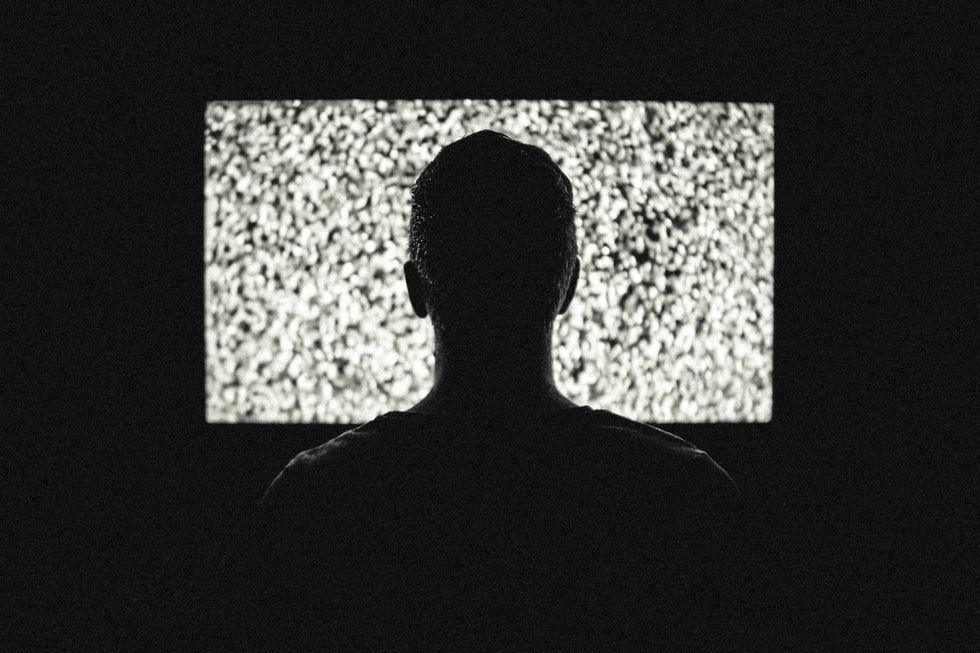"The Believers are But Brothers" is a solo performance written and performed by Javaad Alipor. The play started as a research project into the online lives of people connected to various terrorist communities. After seeing the piece described as “An electronic maze of fanaticism, meme culture, 4chan, the alt-right and ISIS”, I was both excited and apprehensive. It might be insightful, I mean, it did win the Fringe First award for 2018 and is shortlisted for a Stage Innovation Award … but it could also be a man on stage blaming all the world's problems on meme culture.
On the day of the show, we were all sent a link to add our cell phone number to a WhatsApp group chat that would be used interactively during the play. With my phone in hand and low expectations, I settled into my seat for an hour of what I expected to be cringey humor and boredom.
In front of us sat a guy in jeans, a red shirt and sneakers. His back was to the audience as he slumped in a rolling desk chair, cut off from the world by a high tech looking headset, playing Call of Duty on one of three computer monitors. A menacing sheer screen rose up above the computers, through which we could see another man in a headset playing with a game device of some sort. A pattern of military camouflage was projected onto the screen.
For the first 10 minutes, the group chat was allowed to evolve naturally. People amused themselves by saying hello, sending selfies, eventually memes and other dumb silly things, all very predictable for anyone who’s observed a chat thread or comments section online.
Then the lights dimmed. The guy in the red shirt put down his controller and turned to face us. As an entrance, it was highly effective. Even though he had been on stage since we had arrived, until that moment none of the audience had seen his face. He was just background.
“Hi. thanks for coming”
The theater came alive with buzzes, beeps, and chirps as everyone turns, their attention to the screens in their laps.
“Don't worry, I'll be talking to you soon”
Over the next hour, Alipor switched between texting the group, speaking to the audience and speaking into a webcam with the image projected menacingly onto the screen to tell three stories. The first two detail the lives of two UK young Muslims, living hundreds of miles apart, both growing up feeling hated and left out of the things they think they deserve, made to feel small by anyone who is not like them.
Each one sees a video of a girl singing in a market in a town in the middle east right before it is blown apart. Horrified and sickened, one searches and searches till he finds the source of the video and is introduced to an electronic world where Islamic fundamentalism lives. The other, angry over the treatment of his people, goes to a rally and is given the number of someone who says he can help the man fight for his rights. Their egos boosted, their ideals catered to, the two men are finally feeling some sense of power and control in the world. Alipor then tells a new story.
A young white boy in California who isn’t “cool”, has few friends and is generally ignored by women. Through various threads on the internet, he finds communities who validate his growing feeling that women and minorities are taking away his opportunities and the life that he deserves.
Things escalate.
By the end of the hour, Alipor had not only pointed out the parallels in the progression from insecurity to violence of the three young men but also foretold doom should fundamentalist groups like ISIS and factions such as the alt-right fully realize the power they hold.
As a piece of performance art, Alipor’s play was highly effective. By starting small, with intimate, visceral stories of each man's journey deeper into the communities they found through online platforms, Alipor forces us to empathize with the three men.
His masterful storytelling allows the audience to live fully within the lives of these three individuals while simultaneously being disquieted by how easy it is for the three men to find endorsement for their hate. The show gave insight into the question of “how could they do that?” which I think many people ask about extremists.
"The Believers are But Brothers" was disquieting, strange and powerful, providing a look into the fringe communities who exist to most of us as faceless organizations. Alipor gives them a face, a story, a terrifying humanity.

















